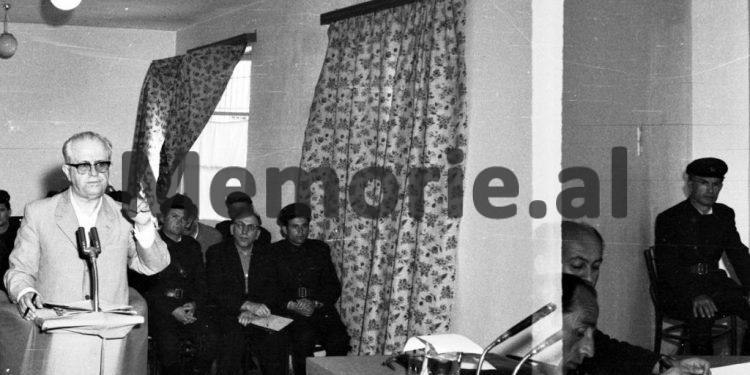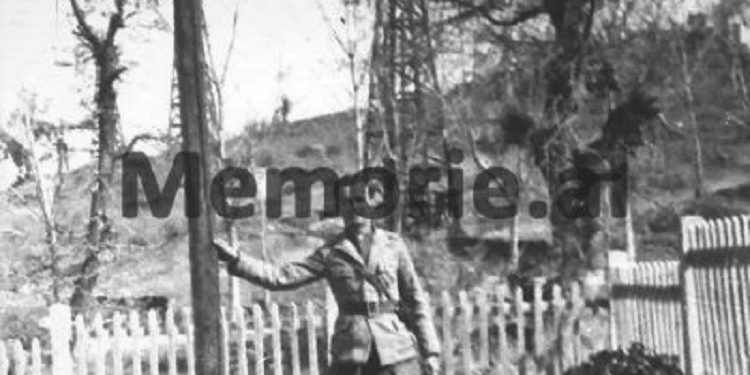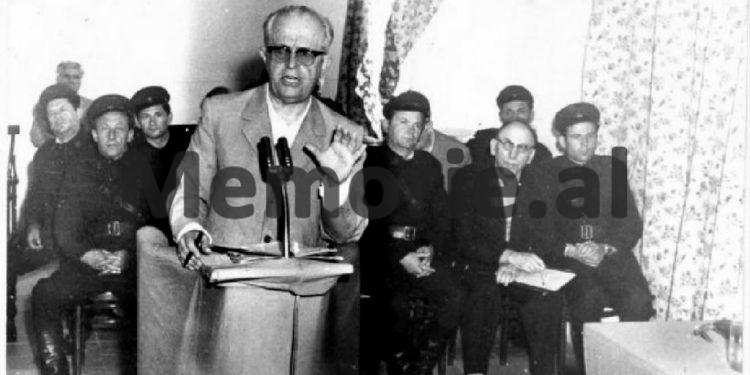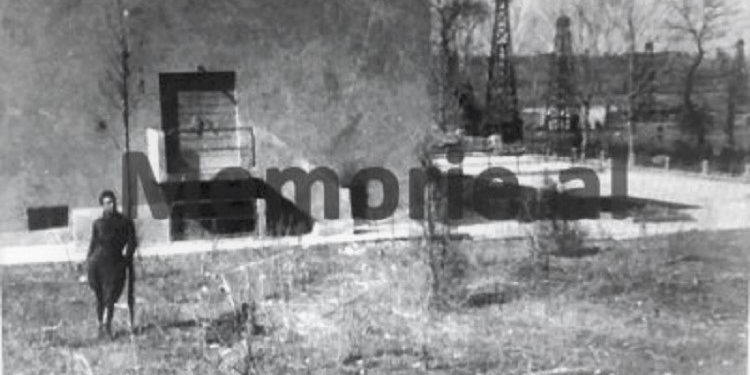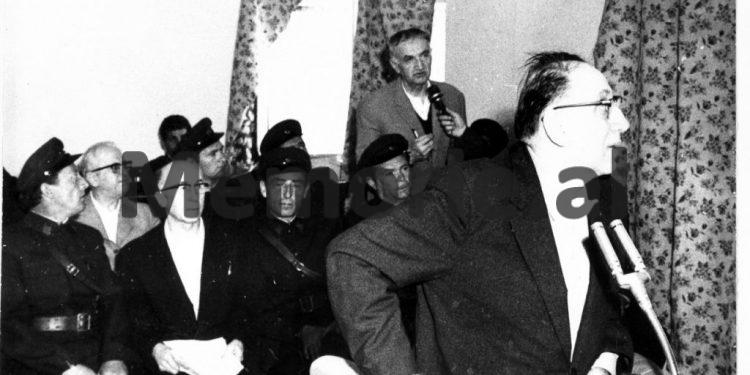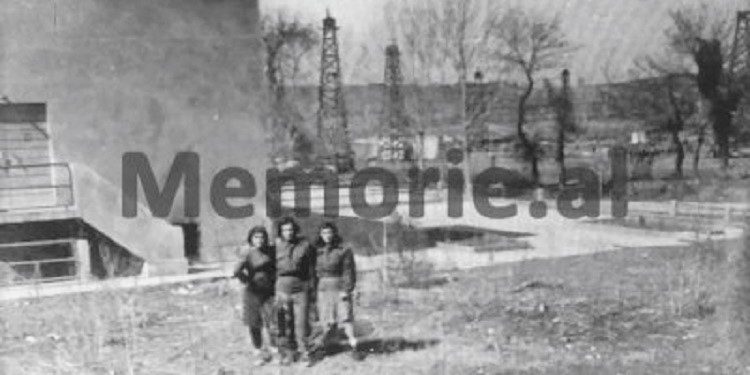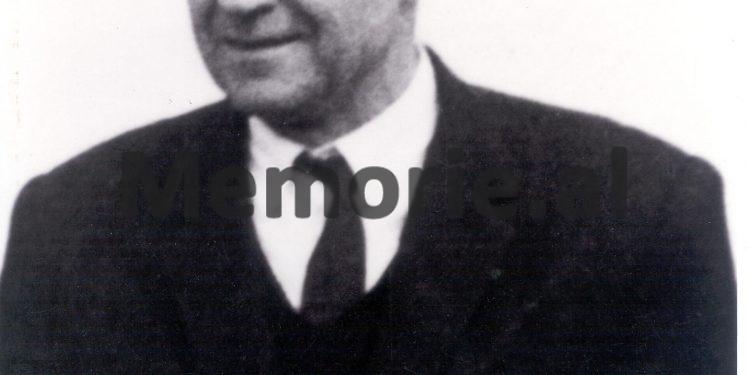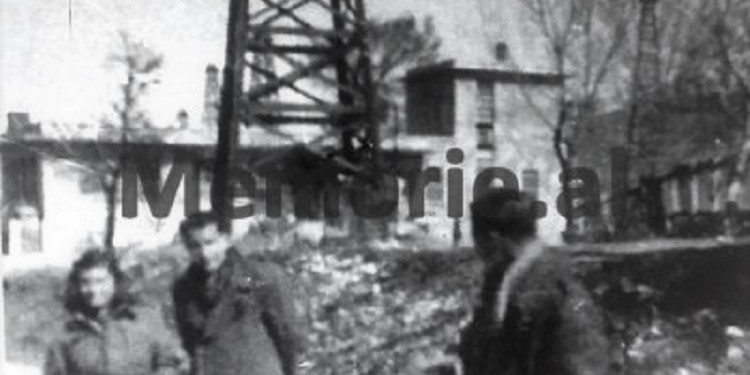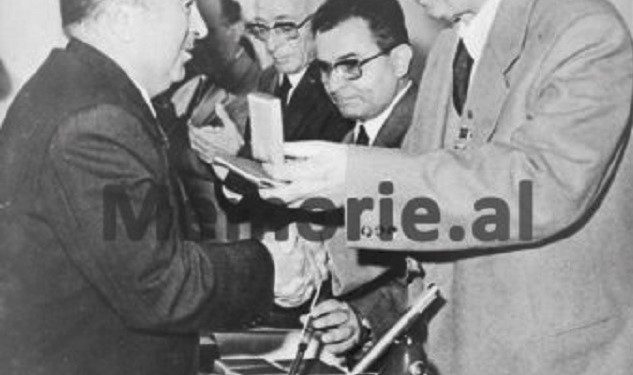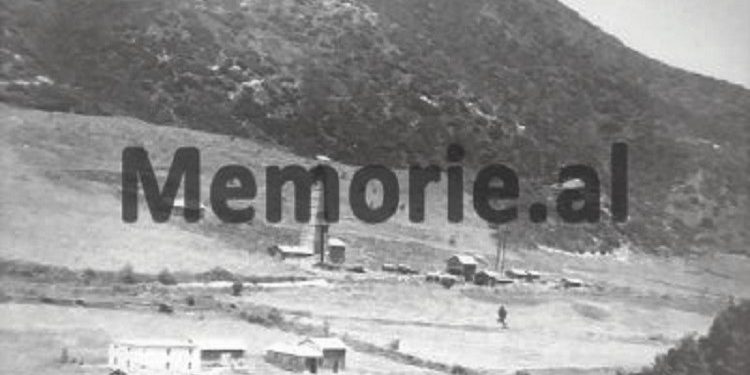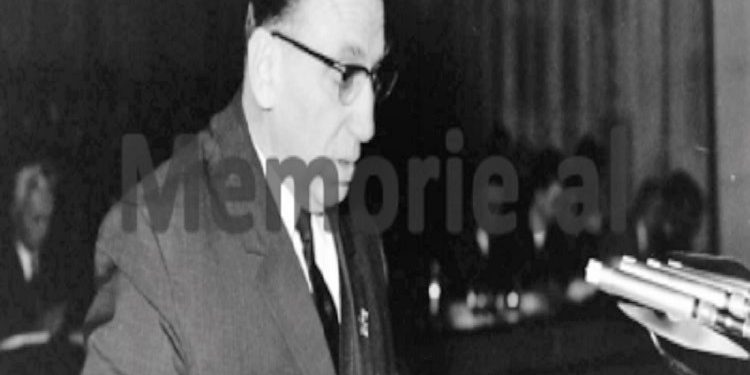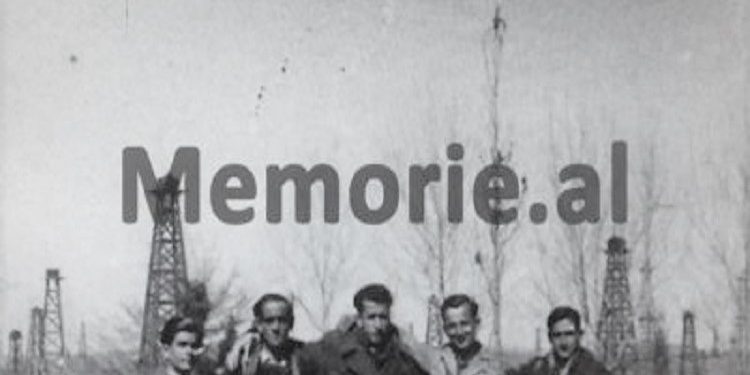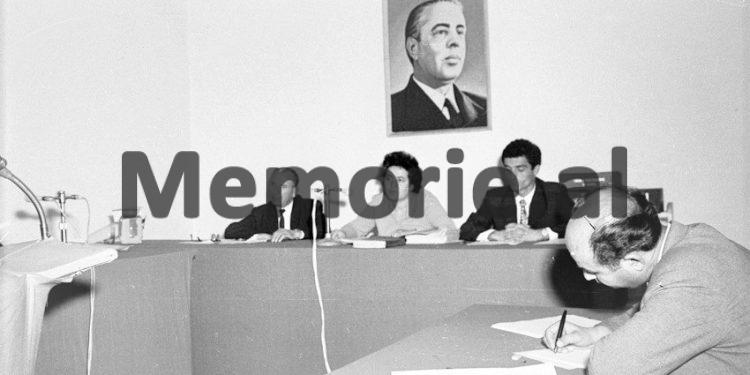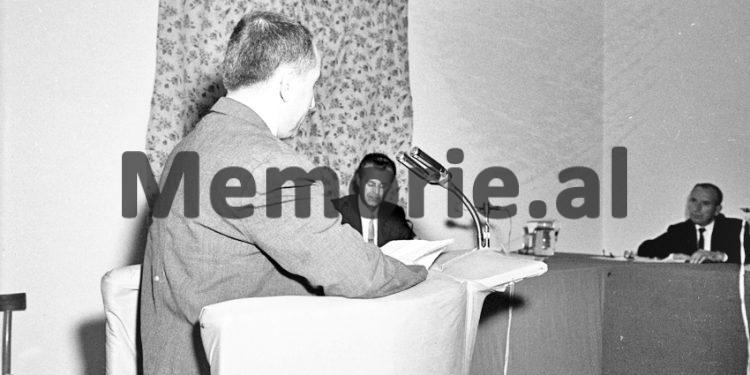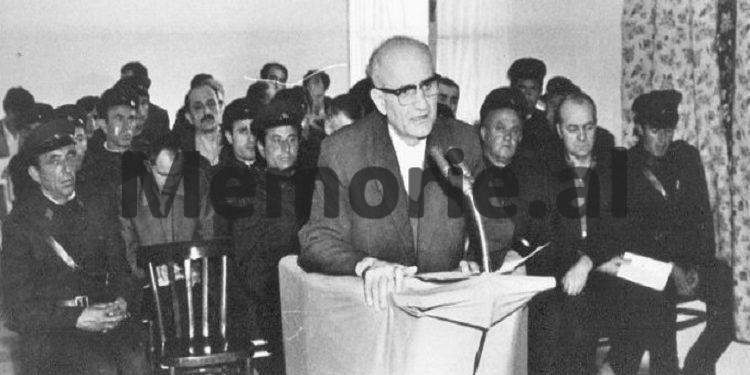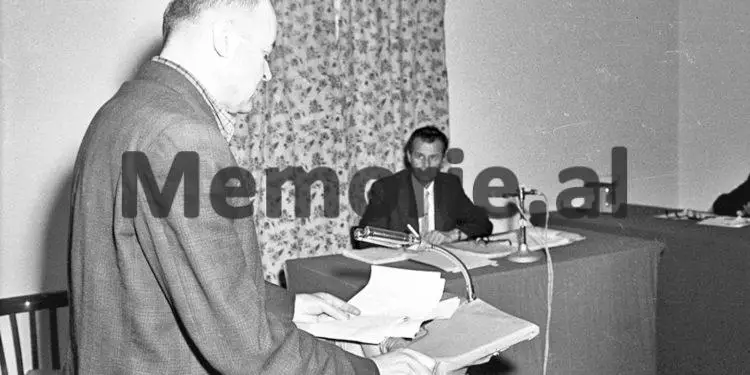Dashnor Kaloçi
Memorie.al publishes some historical documents from the fund of the former Central Committee of the ALP and the personal fund of Enver Hoxha, where it is about a conversation that Enver had on February 3, 1975 with Abdyl Këllez in one of the premises of ” Party House” in the Leadership Bloc, where Hysni Kapo and Pilo Peristeri were also present. The whole conversation between them, where Enver has held Këllez accountable regarding the senior staff and staff working in the Petroleum sector, from the Institute of Study and Design, to the General Directorate, such as Lipe Nashi, Beqir Alia, Koço Plaku, Ramiz Xhabija, etc., whom Enver passed all “through the sieve” referring to Beqir Alia’s former Russian wife, as well as Panajot Plaku, the brother of the famous engineer Koço Plaku, whom Këllezi has defended him by saying that he was one of the best geologists and that he had discovered an oil field! How did Enver keep secret from Avdyl the letter he had sent to a worker from the Oil sector, where, among other things, he told him that there were big sabotages and the intervention of Pilo Peristeri during the conversation, reinforcing to Enver what he thought, that “there was hostile work in Naft…”!
After the attack of the so-called “hostile group in Art and Culture” led by Todi Lubonja and Fadil Paçrami and the “Coup group in the Army” led by Beqir Balluku, Petrit Dumen and Hito Çako, in the years 1974-’75, a few months ago later, in the middle of 1975, Enver Hoxha “discovered” the “Sabotage Group in Economy” headed by Abdyl Këllezi, Koço Theodhosi, Kiço Ngjela and Vasil Katin, where with the exception of the latter two (Ngjela and Katin) suffered in prison until 1991, everyone else was shot, accusing them of “enemies of the people, traitors and saboteurs”!
These things are already very popular because from the beginning of the ’90s and onwards, among other things, many unknown documents have been published that shed light on the paranoia of Enver Hoxha and the innocence of all his collaborators that he hit. and even eliminated them physically. According to some archival documents and also plenty of testimonies of persons who had direct working connections or their family members.
One of the most confusing and tragic stories of all the so-called “hostile groups”, undoubtedly remains that of the “Economy”, whose origin was the Oil sector. Which is confirmed by many archival documents and also a lot of testimonies of people who had direct work connections or their families who were executed as “enemies and saboteurs”?!
Thus, while for the problems that the Oil sector had, at the beginning of 1975, Enver had charged Haki Toska, Abdyl Këllezi, Adil Çarçani and Koço Theodhos, who after attending several meetings in the city of Patos (where the Directorate of Adil Çarçani and Haki Toska went as delegates to the main meeting in Fier at that time), and after its completion they reported to the senior leadership on “the problems that the sector had and the tasks left to improve the situation” , and so it was considered a “closed problem”.
But it seems that a worker, a former specialist in the Oil sector, did not like that, who after having acquired a disability, was sent to work in a light job, as a night watchman, in one of the offices of that enterprise. Out of extreme indoctrination, as well as inspired by the “teachings of the Party and Comrade Enver”, especially when it came to the “voice of the masses”, he wrote a long letter, which was addressed personally to “Comrade Enver”. Where he informed and “argued” about the “mistakes, sabotage and hostile work” that had been done in the oil sector.
But this letter, which reached Enver (as well as all the letters sent to him), turned out to be fatal, as Enver returned to the oil problem, considering everything he had written to be true. that worker who worked as a night watchman.
And with that letter in his pocket that he considered a revelation, he shouted or talked casually to Theodosius Celles, who then shot him, boasting that “all hostile groups had been discovered by the Party.” Which Enver admits himself, writing in one of his diaries dated, February 3, 1975, which Memorie.al is publishing in this full article and without any changes.
Enver Hoxha’s diary
Conversation with friend Hysni Kapo
February 3, 1975
Last night I was at the Party House. Abdyl Këllezi also came there. “What do we have?” I asked. “We have nothing,” he replied. He paused for a moment, then said, “We are not doing well in the oil.” “Why aren’t we doing well,” I replied. – What happened?”.
“Yes, oil is not working for us,” he continued.
“I know the research plan has not been realized,” I told him. – We have raised this issue in the Politburo and we have discussed not only the fact that the production plan is not being implemented, but also the issue of organization. “We have set up an oil research institute that even developed capitalist countries may not have such a large one, with hundreds of people!”
“And that’s where our work is not going,” Abdyl told me.
“Why do you think we are not doing well?” I asked.
“It’s the concepts that hinder,” he replied.
“What are these concepts? “Doesn’t he tell us a little about these?” I said.
“Yes,” he replied, “there are all kinds.” “According to one of these in oil we have to walk with hope, according to another we have to walk deeper.”
Then he said that there are quarrels between the leaders of this sector.
“Well,” I said, “for these quarrels, why does the Government not take measures to resolve them?”
“I went there on the spot with Kocho (Theodhos) in September,” he said, “and I told him all that I am counting on you.”
“Have you informed the Government about all this?” I asked.
“Yes, I have made a report on these problems, even in detail,” he replied.
“Tell me something about the concepts that the leaders there have,” I asked him.
“When I was there,” he told me, “someone stood up and said, ‘Comrade Abdyl Këllezi, we can’t find oil here.'”
“Is there oil or not?” I intervened.
“Yes,” said Abdyli.
“Then, while there is, why can’t we find it?” I asked.
“That there are conflicting theories among leaders,” he said.
“Which of these do you agree with?” I asked.
“I am for deepening,” he replied.
“You do not tell me, what is this theory of deepening?” I asked.
“It means that when we put a layer on it, we put it to the end and find oil,” he explained.
“Then why did you not do so? – I addressed him. “I have raised the issue of deepening where there is oil.”
Abdyl told me that he had told the interlocutor that he mentioned: “Okay, boy, we have a decision”.
“What is being done here?” He replied.
“An order comes asking for the probe to be lifted from a place where it is placed and put elsewhere. Go here, go there; freeze the probe here and take it somewhere else ».
I did not interfere with Abdyl, because I had the letter of the worker who gave me some signals.
“But who gives these orders one after the other?” I said then.
“Give it to the Petroleum Institute,” he replied.
“Who is for these orders, the directorate or the ministry?” I asked.
“It is the directorate,” he told me, “that the ministry leads in theory. In practice, it seems as if Lipe Nashi leads there, but in fact he directs the Institute ».
“How is it possible for Lipe Nashi to lead, when no one is left to him, when the General Directorate of Petroleum has no chief geologist to help him?”, I intervened.
“It is so,” said Abdyl, “that all the senior specialists are at the institute.”
“What is this directorate doing?” I asked.
“She deals with administrative matters, trucks and other issues like these,” he explained.
When I was interested to know who are the people who run the institute, Abdyli told me that one of them is Beqir Aliaj.
“Is he the one who has the Soviet wife?” I added.
“He had it, he left it and took an Albanian,” Abdyli jumped.
But Beqiri is known as a heavy man, arrogant and arrogant.
“Apart from this, there is another one named Koço Plaku,” said Abdyli.
I asked him who this “Brother of Panajot the Elder” was, he replied. “But why did you put Panajot Plaku’s brother to work in such a vital sector of the economy?” I asked.
“He is a good geologist,” Abdyl underlined, “he has even discovered an oil field.” There are then other cadres. We went with Koço and heard about things”.
“What measures did you take?” I asked.
“First,” Abdyl explained, “I discussed there: I told you why you are doing this and why.”
“Then what happened? “Did you raise the problem with the Government and what measures did the Government take?” I asked.
“We submitted it and the Government instructed Comrade Adil to look into the matter. I do not know exactly, but it seems to me that Comrade Adil has had several meetings with the commission, has issued some things and informed me that he said all this to Comrade Haki (Toska) in a report, even with names “.
“These are very serious, more Abdyl,” I told him. In a word, I had the impression that Abdyl wanted to show that he said these things where he should and now he is telling me too.
“You have to take the issue more seriously,” I told him. – While the Petroleum Institute is organized by hundreds of people, how have you not seen this issue before? Then, when was all this organic approved?” I asked.
“It was approved when the Government meeting took place,” he replied.
“If the institute is inflating and taking over every problem, that the General Directorate has nothing in hand to run the oil, how did these issues not get your attention?” You have not once asked yourself the question: «More, what is this directorate doing? What about the ministry?” I asked.
He told me: “We used to have an oil commission, where Ramiz Xhabia was also. But it was done there as Lipe Nashi said and Ramiz Xhabia was removed “.
I asked him what Ramiz is doing now.
“He is a very good man,” he replied.
“Didn’t the others put their elbows on anything, more Abdyl?”, I cut him off.
“I do not believe,” he told me. Then I asked him why Perikli Prifti was removed from the oil.
“It was there,” he said, “we removed it and took it to university for good.” He was a really good cadre in oil. From there we removed the party secretary and, in his place, we put an oil engineer, a very good man. “He does not deal with oil at all now, because he deals with all issues.”
“That is to say, in oil we do not have any member of the Central Committee now,” I concluded. We also removed a candidate friend of the Central Committee who had a party secretary in Fier, Naunka Bozon, from there “.
COMRADE HYSNI KAPO: She came as vice president of the General Council of BGSH here in Tirana.
COMRADE ENVER HOXHA: In a word, now we have none of the friends of the Plenum left in this important sector in Fier. I could not bear it any longer, so I said to Abdyl:
“You have a responsibility for this problem. “The comrades of the base informed me not in words, but in documents that the oil is being sabotaged.”
“Yes, I have pointed out these things,” Abdyl justified. I thought we’d leave it at that. But, as I started talking to my friends about agricultural problems, Abdyl turned to this problem again and added:
“We have to see, Comrade Enver, that oil is very important.” Then Pilo Peristeri jumped in and, as he has, said:
“This is how these intellectuals are, but this issue must be looked at really well, let there be hostile work in the oil sector.”
“If that is the case, neither the people nor the Party will forgive us,” I said. To shoot at our oil, all the enemies have attacked us: the Italians, the Soviets, Tuk Jakova, Pajo Islami and who has not attacked us to harm us in this sector. So, let’s take a good look at the oil problem, “I concluded, and that’s how we left the issue. I wanted Haki to be here today to tell us a little about this problem. I want to know what he thinks too.
Attached to this article, we are publishing some rare photos with unknown images from the period of the first years after the War, (which show the main leaders of the oil sector who have not yet removed the partisan military uniform) and some others from famous trials of “Oil saboteurs” ./Memorie.al




